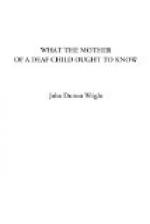When a mother first suspects that her child’s hearing is not perfectly normal, what should she do? Of course, first of all, the best available ear specialist should be consulted at once in order to determine whether the cause can be removed and normal hearing restored. Sometimes, however, the specialists are uncertain of the outcome, and sometimes their hopes are not realized. In the meantime, precious days and weeks are passing in which something could be done for the little one educationally, without in any way interfering with the medical efforts at relief. The two things can be, and should be, carried on simultaneously. If normal hearing is restored no harm has been done by the educational training; in fact, the development of the child has been advanced. On the other hand, if the hopes that were entertained are disappointed, then precious and irrecoverable time has not been lost.
The title presupposes that the mother has already accepted the fact that her child’s hearing is not perfect, and, for the sake of the child, it is to be hoped that this knowledge came to her very promptly after the occurrence of the deafness.
One would naturally expect a mother, of her own accord, to carefully test all the senses of her child by many simple and repeated exercises during the first few months of its life. The many cases, however, in which deafness on the part of a child has not been recognized, or at least not acknowledged, by the mother till the third, fourth, or even fifth year, show a strange neglect of a highly desirable investigation, and a natural unwillingness to accept a truth, the possibility of which must certainly have occurred to her long before.
If she could only realize that she need not feel downcast and heavy-hearted by reason of her little one’s imperfect hearing; if she could only know that she need not look forward to a life for him different from that of other children; if she could understand that training and education can enable him to overcome to an extraordinary degree the disadvantage of deafness, she would set about the task with cheerfulness and hope, and if she knew that the sooner she began, the better it would be for the little one, she would not stubbornly refuse for so long to acknowledge even the possibility of deafness.
II
HOW SHALL THE MOTHER BEGIN HER PART OF THE WORK?
First of all, something like an inventory should be taken of the faculties possessed by the child which he can use in working out his problem. Has he good sight, normal smell, taste, muscular sense, and memory? To what extent is his hearing impaired? Is there any possibility of restoring it to normal acuteness, or of improving it, or of preventing any further impairment?
The completeness with which these questions can be answered depends, to a considerable extent, on his age and his physical condition. We will suppose that he is about fifteen months old and in good bodily condition. If he is older, the same tests would be used to begin with, though we could at once pass on to more complicated and difficult ones that cannot as yet be used with the fifteen-months-old baby.




